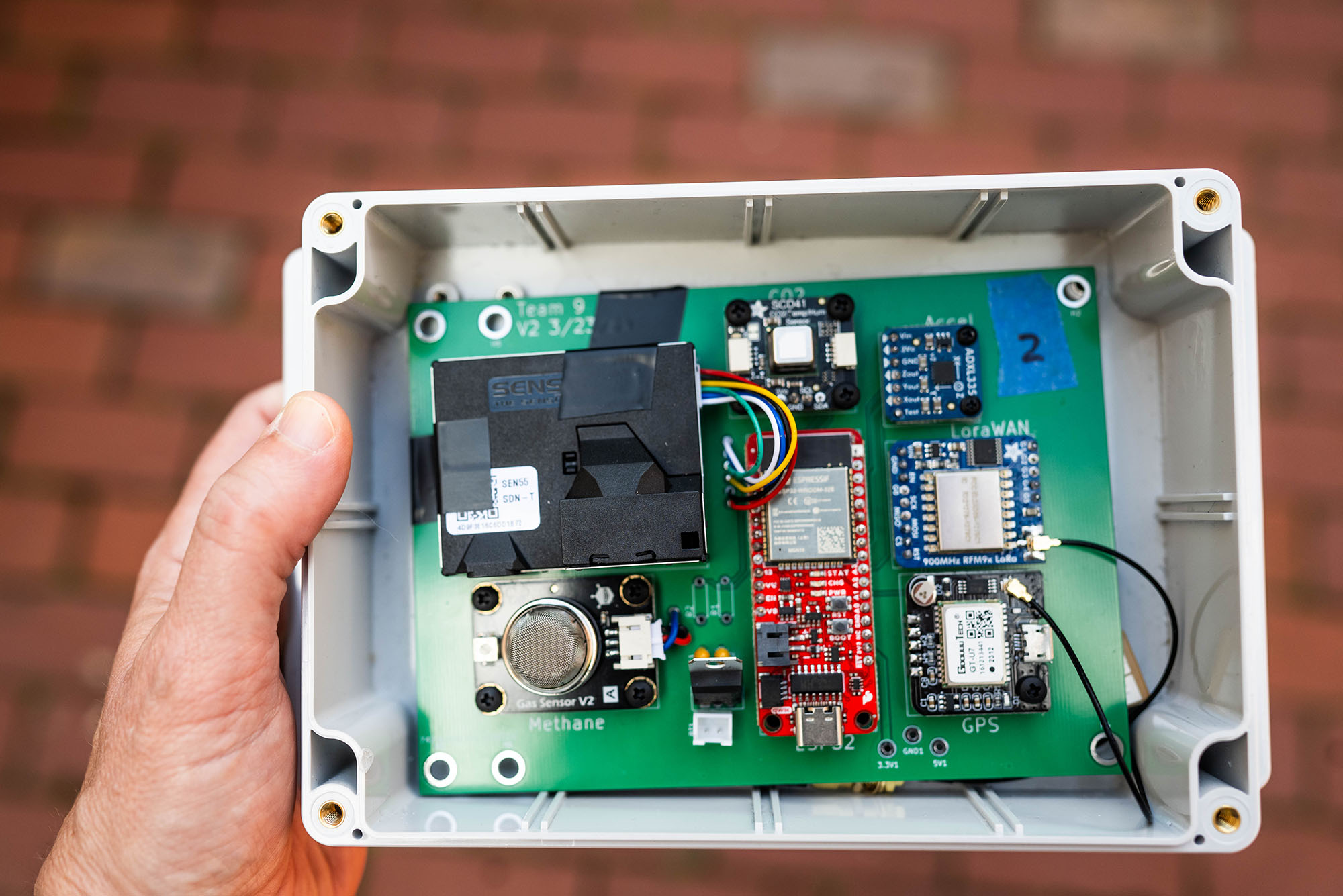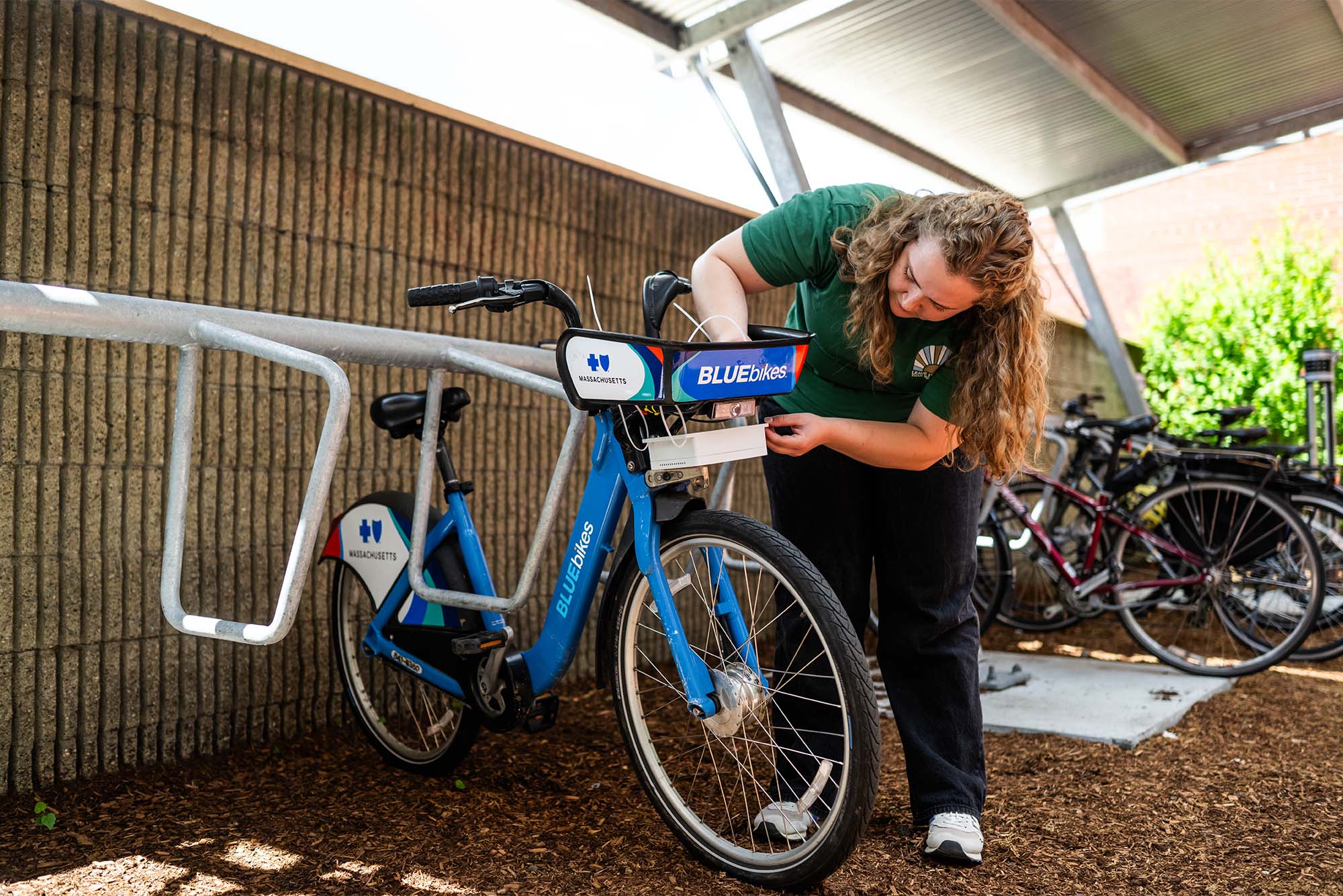Air Quality Sensors Could Be Coming to a Bicycle Near You
A team of BU undergraduates’ air quality monitors have won them the 2024 Janetos Climate Action Prize
Air Quality Sensors Could Be Coming to a Bicycle Near You
Air Quality Sensors Could Be Coming to a Bicycle Near You
Imagine being able to contribute to scientific research just by riding a bike: your bicycle automatically collecting valuable air quality data from the different neighborhoods you pedal through, creating a mobile network of air quality monitors. That’s the vision a group of students at Boston University are working toward.
For their senior design project, a team of College of Engineering undergraduate students created a compact air quality sensor pack that can be attached to the front of a bicycle from Bluebikes, Boston’s public rental network. As air passes through the sensor box, it measures local levels of carbon dioxide, methane, particulate matter, and nitrous oxides, while also recording temperature and humidity. The sensor is equipped with a GPS to pinpoint where data is being collected, as well as an accelerometer, a device that senses movement of the bike so it knows when to switch on and off.
Squeezing all of those gadgets into a 5”x8” box, ensuring the electrical equipment could be jostled around on a bicycle without damage, all while remaining protected from harsh weather and rain, proved to be a challenge.
“All of the components of the project are equally important,” says Sofiya Filippova (ENG’24), who started working on the project in fall 2023. “Because if we don’t have the electronics working, or don’t have the communication, or don’t have the physical enclosure in place, everything falls apart.” There was also the added task of making sure the sensor box didn’t interfere with the Bluebikes operating system or the rider experience.
Filippova, along with her teammates—Lorenzo Barale (ENG’25), Luisa DiLorenzo (ENG’24), Maya Lobel (ENG’24), Leon Long (ENG’24), Benjamin Pedi (ENG’25), and Kai Raina Tung (ENG’24)—tackled all of these elements over the past two semesters with Emily Ryan, an ENG associate professor of mechanical engineering. After months of tinkering and wiring, the team landed on a final design and took the sensor box out for a spin, attaching it to the front basket of a Bluebikes bicycle with small zip ties. The students took turns riding the bike, each through different Boston neighborhoods, and at the end of their test rides, reviewed the recorded data in a cloud-based communication system that showed data points mapped block by block throughout the city.

“You can clearly see where the data is mapped, on the scale of one city block, and so that’s a huge success in our eyes,” Filippova says. With such promising results and potential, the team won the 2024 Janetos Climate Action Prize, an award given to students working on a high-impact project. The prize is open to projects funded by the Campus Climate Lab, a program led by BU’s Institute for Global Sustainability (IGS) in partnership with the University’s sustainability and research offices. The work will continue to receive funding from the climate lab over the summer.
Globally, air pollution is getting worse. Cars, roads, fossil fuel infrastructure, wildfire smoke, industrial facilities, and other human activities often make air dirty and unhealthy. But the quality of the air we breathe can vary from town to town, neighborhood to neighborhood. Ryan, an associate director of IGS, helped lead this project as a way to get a more complete picture of air pollution in Boston.
“Does the current data being collected reflect air quality in every neighborhood? Absolutely not,” she says. Currently, Boston reports air quality data from five sensors located around the city—in Kenmore Square, Chinatown, Dorchester, Chelsea, and Roxbury. So, having an expansive network of air sensors constantly collecting and mapping data could provide valuable insights about places where there isn’t any air monitoring, and could even help utility companies find areas where there are gas pipes leaking methane, or pinpoint urban heat islands that could use more trees and shade.
“We know that local conditions really affect air quality locally,” Ryan says. “The weather affects it, but also the trains, the buses, the highways, so there are a lot of stakeholders who could be interested in this data.”
Before you start seeing air sensors attached to public rental bikes, there’s a lot more work to be done. The team’s goal for the summer is to continue consulting with the company, which has been supportive and interested in the idea, and work on validating the data collected by testing it against commercial air sensors that are already used for research purposes around the BU campus. Ryan is also in conversation with BU Facilities Management & Operations to explore the possibility of adding sensor packs to the BU shuttle buses.
Filippova says she thoroughly enjoyed her experience with the team and will continue working with Ryan for the summer before beginning a master’s program in mechanical engineering at BU.
“Our team had the best time together,” she says. “I think our ability to produce a good product in the end is because we had so much fun doing it.”
Watch the video above to learn more.




Comments & Discussion
Boston University moderates comments to facilitate an informed, substantive, civil conversation. Abusive, profane, self-promotional, misleading, incoherent or off-topic comments will be rejected. Moderators are staffed during regular business hours (EST) and can only accept comments written in English. Statistics or facts must include a citation or a link to the citation.